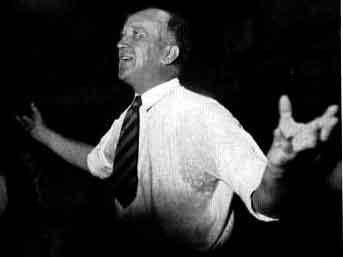Nineteen thirty-two was one of the worst years of the Depression, and William Z. Foster, 51, was running for the third and last time as the Communist Party’s candidate for President of the United States.
A native of Massachusetts, at the age of ten he was forced to leave his Philadelphia school in search of work. He traveled the country working in a variety of unskilled jobs and soon became a labor organizer.
By 1924 he had become a member of the Communist Party and in that year ran on its ticket for president of the United States. He ran also in 1928 and once again in 1932.
The party’s platform envisioned the ultimate demise of capitalism and the establishment of a workers’ republic; but it also painted a hopeful picture of an America free of racial oppression, labor strife, hunger and poverty.
In 1932 Foster visited Los Angeles on a campaign swing, and this is the way the Los Angeles Illustrated Daily News reported his reception.
|
June 29, 1932 RED PRESIDENT CANDIDATE ARRESTED AS SYNDICALIST William Z. Foster, Communist candidate for president, and nearly a score of persons seeking to hear him speak, were arrested yesterday by the police red squad as the leader attempted to address a political meeting at the Plaza. Of those seized, only Foster and three companions were held. Foster was booked on suspicion of criminal syndicalism. With him were Edward W. Sandler, accused of disturbing the peace; Ezra F. Chase of the Sawtelle Soldiers’ Home, and Raymond Lugo, 33, of the Midnight Mission, both booked on suspicion of criminal syndicalism. Tear Bombs Hurled Later in the day, Superior Judge Elliot Craig signed a writ of habeas corpus for Foster’s release. Bond was fixed at $10,000 on the writ, which was made returnable today at 3:30 p.m. Although Foster’s sympathizers milled about the city for several hours, demonstrating against the arrests, violence was confined to the throwing of a few gas bombs by the police squad. Local communist leaders had announced that they would hold a meeting at the Plaza in defiance of police orders, after a similar meeting in a hall on Broadway had been broken up by police. In addition to its political significance, the meeting was to protest the recent shooting of a member of the Unemployed Council in a police raid on an open meeting in a private home. Thousands In Cry Nearly 1,000 sympathizers immediately started shouting, “We want Foster,” continuing until the officers dispersed them with tear bombs. Minor outbreaks took place throughout the city for the rest of the afternoon as Communists gathered on street corners to throw “red” literature on the sidewalks. June 30, 1932 FOSTER, OUT OF JAIL, IS PROPHET OF DICTATORSHIP By C. H. Garrigues The politico-economic warfare which has engulfed the western world is already in America taking its final form — a battle to the death between communism and fascism, in the opinion of William Z. Foster, Communist candidate for president, who got out of jail early enough yesterday to give a brief interview before flying to Phoenix for a speaking engagement. Neither socialism nor democracy, he declared, exists today as a living force; each constitutes only a moribund body of doctrine from which the rival forces are seeking to draw recruits. Each has lost, not numbers of lip-servers, but the once firm faith of its adherents that through one or the other doctrine lies salvation. Socialism, he intimated, has been captured bodily by industrial leaders, now advancing theories half-socialist, half-fascist. Democracy is being attacked from without by communism, while its own leaders bore from within, seeking to undermine its walls and capture the citadel in the name of fascism. The wave of contumely, contempt and ridicule directed at Congress during recent months is a deliberate attempt to destroy the confidence of the American people in representative government, clearing the way for a dictatorship, he says. Even to one accustomed to finding the devil considerably less black than he is painted, the Communist leader proves a figure of disturbing contrasts. The blue eyes are mild, gentle, almost dreamy. He smiles quizzically as he talks, so that little laugh wrinkles appear about the corners. The lean, rugged fighter’s jaw is in startling contrast. One looks in vain for a sign of the zealot, the fanatic, the bigot. Foster, it seems, approaches the religion of communism not in the spirit of a missionary or a Savonarola, but as a priest celebrating its rites before the altar. When the time is ripe, the worshipers will come. Meanwhile, it is his duty to keep the font filled and the altar swept. He disagrees with many non-Communists that the police departments’ policy of suppression is helping the Communist cause. “It changes the direction; that’s all,” he says. “Makes the workers more determined; induces the fallen ones to answer force with force. But it doesn’t help us, nor hurt us. “Tear bombs can’t unmake Communists because you can’t fill a man’s stomach with tear gas. Nor would it help the capitalists to let our leaders talk because campaign oratory can’t fill a man’s stomach either. The capitalists are damned if they do and damned if they don’t. They know it and are afraid. That’s why they hire policemen to beat us up.” |
Foster and the others arrested never faced trial. And just a few months later, he suffered a heart attack that ended his campaigning in that election.

He died in Moscow in December 1961.